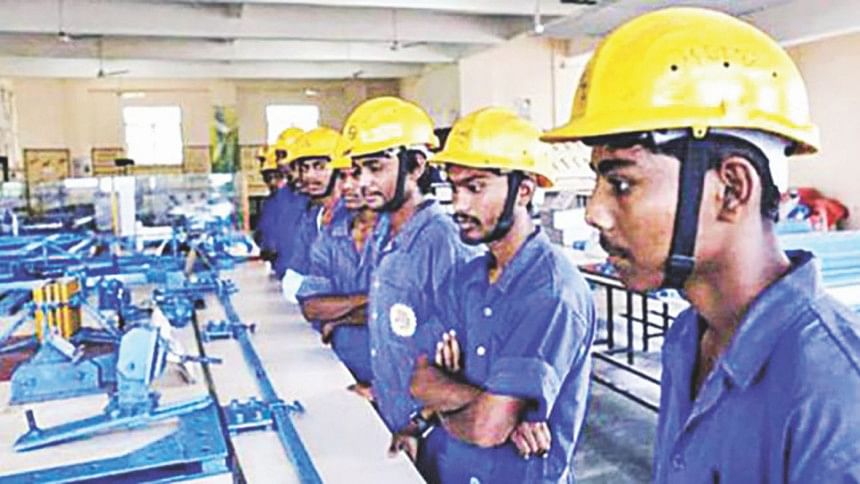Changing how we see vocational education

Bangladesh has gone through both social and cultural changes during the past two decades. Things were very different for the youth in the 1990s compared to now. Free access to information via the internet has changed the way we think and has helped to shape our ideas. How we utilise information has also changed drastically. The world is much more global now. Gone are the days when we sat in front of the TV on a Wednesday night eagerly waiting for MacGyver to air on BTV!
But even though our access to entertainment has increased dramatically, we cannot say the same for education. Society has become very rigid when it comes to the education system. There is more divide in the system now than there was 30 years ago. There are English-medium and Bangla-medium schools leading to college and university education, technical vocational training, non-formal education, madrassa education, etc. These systems run parallel in a country where the mind-set of people towards technical education is still negative, even though unemployment among university graduates is as high as it has been in recent memory.
According to an Economist Intelligence Unit and British Council survey in 2014, Bangladesh had the lowest employability among university graduates in South Asia; 47 out of 100 to be precise. The number is staggeringly higher for women.
Even though specific technical skills can be the right way forward for the majority of young people who will be the drivers of Bangladesh's success, we are still falling short in realising that a university degree is not enough to meet the specific demands of the market. There are simply not enough jobs in the market to employ thousands of graduates who want to be either bankers or managers without having the right set of skills. There has to be more passionate practitioners and entrepreneurs who will enter the market and create jobs for people.
A successful approach will be to identify the skills that our youth are interested in and try to focus on giving them specialised support so that they can further hone these skills to be competitive in the market. For example, if someone is good at fashion designing, parents and well-wishers should encourage them to focus on being an entrepreneur or work in the fashion industry so that his or her full potential is realised. As we increasingly spend more time of the day at our workplaces, we need to be passionate about our work. But our traditional negative mindset about the fashion industry stops us from letting our children learn more about this industry that is rapidly growing worldwide! We, as parents with fewer children, want them to become either doctors, engineers or bankers—choose professions that are "socially" ranked higher than fashion designing. Having worked in the skills development sector, the narrative I hear too many times is that parents or well-wishers do not think that technical and vocational training can be a lucrative life choice. A person with a diploma is seen to be "less" successful than a "banker" even if they earn more.
As Bangladesh moves towards becoming a middle-income country, it has been rightly recognised that skills training on demand driven trades is the key to greater economic growth. In this regard, it has been repeatedly mentioned in various reports that utilising our current demographic dividend is crucial. But this is where the issue of perception comes in. Skills training, more commonly known as technical and vocational training, is regarded as education meant for the economically underprivileged and others. Most campaigns that the government and private or NGO training centres run focus largely on skilling the economically underprivileged and disadvantaged people. And it is also viewed that an unskilled and underprivileged youth should get "free" training and easy employment.
What we are missing here is a positive "perception" towards skills development. An underprivileged youth does not aspire to become a technician when it is seen as a menial job. They also dream of becoming a graduate, to be part of the white-collar labour force! We have hardly seen any marketing campaign showing someone from upper-class society doing a vocational training course and then running a successful business. We have not seen any advertisement of a young person utilising his or her technical skills to go abroad and become a highly skilled businessperson.
The challenge here is to change the mind-set around skills training. Practical skills should be valued regardless of a person's familial or economic background. Young people in Bangladesh should aspire to become practitioners who will drive the country's economic engine. To that end, more information should be available about skills training and communities should encourage young people to take up these professional jobs. University education should not be regarded as the only path to becoming an "active" member of the workforce. All students should have the scope to explore their interests in vocational training. It's time to break the stereotypes and bridge the gap between technical and academic education.
More focus should be given on changing the perception of existing vocational training opportunities through nationwide awareness programmes and advocacy. It should not be portrayed as an option for the less fortunate who can't invest in education and, thus, opt for technical training. More students should be encouraged to think outside the box, having fewer academic degrees and more practical knowledge, so that they can be highly skilled workers or entrepreneurs who create jobs—and do either of the two abroad. Only then can our country flourish and be the next Asian Tiger.
Tasmiah T Rahman is Head of Programme, Skills Development, BRAC.





Comments